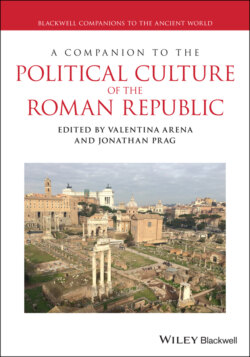Читать книгу A Companion to the Political Culture of the Roman Republic - Группа авторов - Страница 52
4.8 Virtus in the Service of Freedom
ОглавлениеTo some extent, the taste for Latin quotes and Roman comparisons in revolutionary debates can be said to be simply rhetorical filigree: from (almost) all republican sides, the monarchy is flayed with lessons from Roman historians (Martin 1983; Bouineau 1986: 152–153), Roman heroes are summoned to praise great French achievements or point to the path that ought to be followed, ambitious Roman men are invoked to weigh the risks of granting too much power to anyone. However, this reading is shallow indeed, for it misses the very normative constraints that protagonists both exploit and are subject to in their ideological battles. Among the many and no doubt conflicting constraints, only one – but a major one – will be highlighted here: references to the Roman Republic function as a reminder for former subjects of monarchy of the kind of virtue that acts in the service of freedom.
This is especially visible when adversaries struggle with the same reference. In his first speech to the Convention (13 November 1792), Saint-Just (2004: 476, 483) argues that the king must be treated ‘as an enemy’, as did Brutus in stabbing his own friend, Caesar. But should Saint-Just’s point be interpreted as intending to show that ‘Brutus chose political virtue over the good of any one individual’ (Linton 2010: 405)? It is true that Brutus’s tyrannicide constitutes ‘an example of virtue’ that Saint-Just fears is lacking in the Convention. However, what is at stake here is not the republic of virtue embodied by republican exempla but the idea that suing a king for oppressing his people would be incompatible with the task of founding a republic as a ‘free nation’ (Saint-Just 2004: 477, 480–481): ‘We must courageously move forward towards our aim…We are looking for freedom!’ (477). That a free republic is the revolutionary goal – and virtue the way to reach it – is confirmed by the heated exchange in the debates on the 16 December 1792, where the Girondins themselves appealed to Brutus to justify their proposition to chase the Bourbons away from France, putting the Montagnards in a difficult position since they had allowed an aristocrat (the former Duc d’Orléans) to enter their ranks. Saint-Just retorts that it is not enough to swear to be Brutus’s faithful interpreters: the Girondins should also clarify the underlying motive of their stand, for while Brutus did expel the Tarquins ‘in order to secure the freedom of Rome’, Saint-Just suspects the Girondins of aspiring to become ‘other Tarquins’ (Arch. Parl., vol. 55, 83, my emphasis; see also Saint-Just 2004: 757). Saint-Just’s point is that the Roman lesson makes freedom the yardstick of virtue (see 763–764).
This lesson is perhaps best illustrated by Desmoulins’ Le Vieux Cordelier (VC), a journal of six issues published from December 1793 to January 1794. His ‘veracious and republican writing case’ (VC3, 44) emphasises the ‘lessons of history and philosophy’ given by Tacitus, Sallust and Machiavelli (VC1, 7; VC4, 62) as critiques of the dangerous slope taken by the Revolutionary Government (see Chapter 10; Chapter 2). Desmoulins admits that France is in a terrible predicament: the raging war between republican freedom and monarchy (VC3, 39; VC4, 53) requires such perilous institutions as the Revolutionary Government and Tribunal (VC5, 58–59; VC3, 42, 47). But the politics of terror, he argues, has become self-defeating: it undermines the conditions that would help the French people to act virtuously in defence of the threatened republic (VC5, 91). The concentration of power corrupts even the most virtuous men; systematic suspicion advocated by the Revolutionary Government substitutes fear for virtue in the people and makes every genuine human quality the object of the despot’s envy (VC3, 34); furthermore, arbitrary power swoops down on innocents (VC4, 52). A ‘Committee of Clemency’, inspired by Brutus’s advice to Cicero (Cic. ad Brut. 1.2a) not to stir up anger in times of crisis, would thus have better effects (VC4, 56, 58, 61–62). But just as Desmoulins’ charge in the name of the freedom of the press and the rights of man (VC4, 50) makes the most of Roman republican ideology (Levin 2016), Robespierre’s answer puts it to use. Blaming those who believe that ‘the blueprint of French revolution is writ large in the books of Tacitus and Machiavelli’ (Robespierre 1794a: 540), Robespierre repeats his creed: the politics of virtue (544) is but the means to the ‘goal towards which we aim’: ‘the peaceful enjoying of freedom and equality’ (541). But since ‘rumbles the tempest’ of war, the Terror must be adopted against enemies as a momentary measure to secure freedom (549 sq.). Not surprisingly, however, Robespierre is eager not to let history – or more exactly Roman republican culture – have the last word against him:
One [Desmoulins] looks for examples in the history of tyrants because he refuses to take them from the history of the people or to draw them from the genius of threatened freedom. In Rome, when the consul discovered the conjuration and put it down immediately by killing Catiline’s accomplices, he was accused to have violated the rules (violer les formes)… By whom? The ambitious Caesar, who wanted to swell his own party with the horde of the conspirators, by Piso, Claudius, and all the bad citizens, who feared for themselves the virtue of a true Roman and the harshness of laws. (553)
Desmoulins and Robespierre agree about the aim of revolutionary action (freedom), the traditional means to establish, stabilise or save a republic (civic virtue), but dramatically diverge at this juncture as to the appropriate means for waging war against freedom’s foes. And they give utterance to this disagreement with the same weapon: Roman republican examples.
